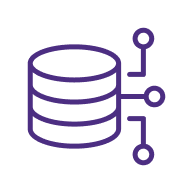Data Science specialization
The Data Science (DS) specialization prepares you with skills to study the computational and quantitative analysis of large datasets to transform data into action. The MSIM program provides pathways to ensure students from all technical backgrounds are able to succeed in this specialization.
Request program information
Our enrollment coaches can help you determine if MSIM is right for you. Your coach can also support you as you apply and enroll.
Data Science specialization overview
This specialization teaches you to use methods, tools and frameworks for analyzing and harnessing data into actionable insights that drive decision-making.
UW MSIM students can complete the Data Science (DS) specialization across any of the three degree tracks offered: Early-Career, Early-Career Accelerated and Mid-Career. Compare our degree tracks to find the path best suited for you.
Skills developed:

Transform data into action by using computational and quantitative methods, tools and frameworks to analyze and derive insights from large-scale, heterogeneous data to make strategic decisions.

Learn the theoretical and practical foundations of data science through key concepts, such as exploratory data analysis, statistical inference, supervised and unsupervised machine learning, scaling and distributed computing, and network analysis.

Use tools/techniques to build large-scale neural models for text and images and understand their impact on privacy and equity.
Elective courses in the Data Science specialization
This specialization consists of three courses that will help you master the theoretical and practical foundations of data science and hone your technical skills. Courses in this specialization are sequenced and cannot be taken out of order.
Learn more about the core, elective and Capstone/practicum courses in the UW MSIM curriculum and the career options available to MSIM graduates.
Introduces technically focused theoretical foundations of “Data Science.” Provides an overview of key concepts, focusing on foundational concepts such as exploratory data analysis and statistical inference. Assignments are data-intensive, and require significant programming and statistical analysis. Students are expected to have college-level statistics and programming experience (R and python preferred).
Provides theoretical and practical introduction to modern techniques for the analysis of large-scale, heterogeneous data. Covers key concepts in inferential statistics, supervised and unsupervised machine learning, and network analysis. Students learn functional, procedural, and statistical programming techniques for working with real-world data.
Challenges and opportunities of data science at massive scale. Covers systems and languages for manipulating data across hundreds of computers, tools and techniques for building large-scale neural models for text and images, and the impact on privacy and equity as these large-scale models proliferate.

Job titles reported by recent MSIM graduates
- Data analyst
- Data management specialist
- Data scientist
- DevOps engineer
- Machine learning engineer
- Software engineer
- Technical program manager
“On my third interview for the job, I was asked to present Python code for a recent data science project, and I had luckily just finished my 574 machine learning project days before. I presented it almost the same way I had in class, and it was enough to impress them. They offered me the position a few days later. ”
Jesse Velasquez, ‘22
Hear from one of our DS students
DS industry stats
$102,800
is the median advertised salary for data science jobs requiring a master’s.
226,708
data science-related job postings.
+19%
is the projected growth rate for data science occupations over the next decade.
Source: Lightcast Occupations and Job Postings, April 2022 to March 2023.
Alumni spotlight
Meet ‘22 MSIM alum Jesse Velasquez, who pursued his degree full time online. Learn about his student experience and how the Data Science specialization has helped his career.
Scheduled events
Check back soon for more upcoming events.
On-demand content
Check back soon for more upcoming events.
Admissions information
Before you apply, please thoroughly research the UW iSchool and the MSIM program. Accordingly, you should be familiar with the vision, mission and values of the iSchool and have a general understanding of the academic design of the MSIM program, including its curriculum and specializations. Please be sure to use this foundational knowledge as the basis for responding to the prompts on the application. If you have questions or need help applying, don’t hesitate to contact us.
Request program information
Our enrollment coaches can help you determine if MSIM is right for you. Your coach can also support you as you apply and enroll.



